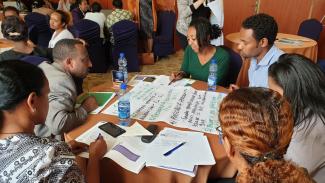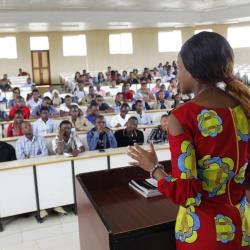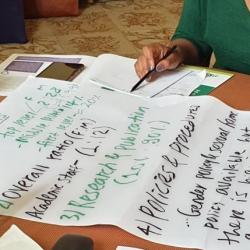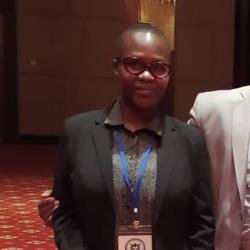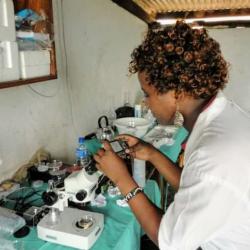Striving for improved gender equality underpins all of INASP's work. In our higher education work, gender-responsive pedagogy and gender sensitisation play central roles in the model developed in the Transforming Employability for Social Change in East Africa (TESCEA) partnership. Through the Global Platforms for Equitable Knowledge Ecosystems (GPEKE) programme, we have supported local partners in Uganda and Ethiopia to establish national networks to support gender equity in research.
Gender-responsive teaching improves learning outcomes for both women and men
To reduce the gender gap in higher education in Africa, it is imperative that both women and men find their higher education environment to be a safe, open and conducive space to learn and to flourish. The TESCEA partnership aimed to transform teaching and learning in university environments so that both male and female students graduate with critical thinking and problem-solving skills, and with the desire to use their skills and ideas to tackle their country’s social and economic problems. Gender-responsive pedagogy was integrated into the fabric of the TESCEA pedagogical approach, to address the gender gap in the classroom and in wider campus learning activities.
“…if gender awareness and gender responsive pedagogy is embedded in [the] teaching – learning space, this will bring everyone on board not only in producing employable graduates with equal opportunity but…[raising] the economic power of both women and men and the society at large and as such, the growth and stability of the country as a whole”.
Professor Flora Fabian, University of Dodoma, Tanzania
Supporting research equity in Uganda and Ethiopia
Equity in research and knowledge is a fundamental theme of the GPEKE programme and throughout INASP’s work. Currently there are many inequities that mean that vital research voices are underrepresented or missing entirely from tackling key development challenges. And, worldwide, one of the key inequities in research and higher education centres around gender. Recognising these issues, UNCST and EAS started working with INASP back in 2018 on dialogue events to explore the challenges around research equity, including gender, in the specific contexts of Uganda and Ethiopia. These dialogues resulted, in the formation of national networks in both countries to understand, educate and champion gender issues. These networks are the Ethiopian Gender Forum and, in Uganda, the Gender Equity in Research Alliance.
Why improving gender equity in research matters in Uganda
Sarah Nabachwa from Mbarara University of Science and Technology, Uganda, discusses gender equity in the Ugandan research landscape. Sarah is the coordinator in the Western region of Uganda for the country's Gender Equity in Research Alliance (GERA).
"When you talk about women’s issues, the men tend to stay away. However, gender is not women. For us to have gender equity, men need to be on board, they need to be with and for us. But I am so glad that in the GERA we have male team members who embrace gender in an unapologetic way. We need to get more male champions on board."
Sarah Nabachwa, Gender Equity in Research Alliance, Uganda
Women in Research: Health and education for the future
There are many inequities in global research and these include inequities based on gender. Many studies have found male researchers are significantly more likely than female researchers to be first authors on papers, and men dominate when it comes to senior academic positions. In 2021 we collected stories from female researchers who have participated in recent AuthorAID courses.
Back to annual review main page

